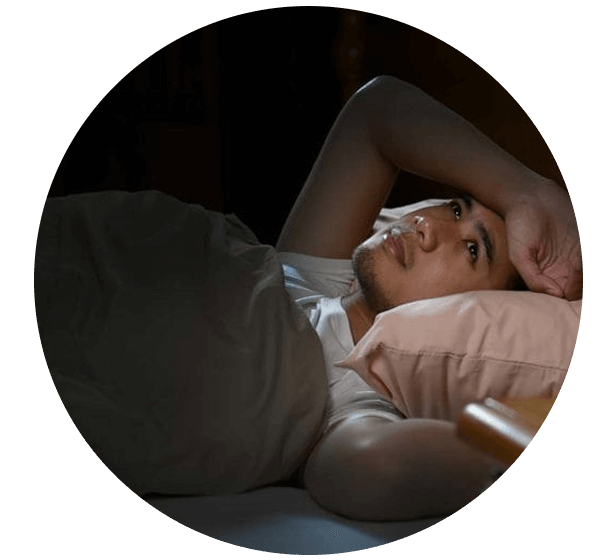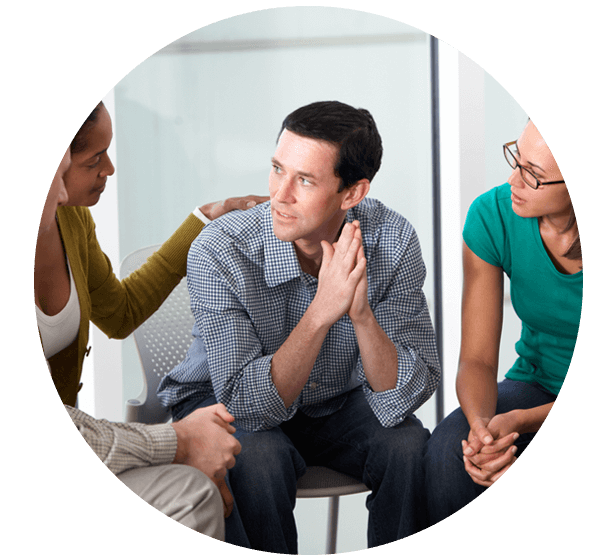Alcohol Withdrawal Symptoms
What Alcohol Withdrawal Symptoms Can You Expect?
Quitting alcohol abuse is worth it. You’ll learn that life in recovery is better than you could have imagined. Alcohol detox is the first step to sobriety, and it’s important you take this step under the care of medical professionals.
Withdrawal from alcohol is one of the worst among addictive substances. Alcohol withdrawal symptoms can be painful and dangerous, even deadly. You should never attempt to detox from alcohol on your own. Detoxing in a rehab facility ensures you’re safe and as comfortable as possible while your body eliminates toxins and your central nervous system re-balances itself without heavy drinking.

What Is Withdrawal from Alcohol Like?
Symptoms of alcohol withdrawal are very uncomfortable. That’s why many people who drink heavily and try to quit cold turkey without medical help relapse. The effects of alcohol withdrawal prove to be so painful that they can’t resist the urge to drink to ease the discomfort.
Known as alcohol withdrawal syndrome, when you drink heavily for a significant amount of time and then quit, symptoms of alcohol withdrawal may include:
- Nausea and vomiting
- Delirium tremens (DTs), which can include seizures, confusion, and trembling
- Psychological symptoms like extreme depression or anxiety
- Headache
- Trouble sleeping
- Sweating and chills
- Mood swings
- High blood pressure
- Fatigue
- Agitation
- Nightmares
- Clammy skin
- Rapid heart rate
- Appetite loss
- Cravings for alcohol
These could be mild, moderate, or severe withdrawal symptoms depending on factors like:
- How long you’ve been drinking alcohol
- The amount of alcohol you abuse on a regular basis
- If you’re also using other drugs
- Your individual physical makeup
- The presence of co-occurring disorders or medical conditions
Who Experiences Alcohol Withdrawal?
Anyone who drinks heavily for a long period of time is at risk for developing alcohol withdrawal symptoms when they suddenly stop or cut back on their drinking. Certain factors can increase your risk of alcohol withdrawal symptoms:
- A history of experiencing withdrawal
- Drinking large amounts of alcohol on a regular basis
- Having other medical conditions
- Abusing other drugs along with alcohol
- A history of seizures
- Certain medications
When Should You Get Help During Withdrawal?
If you’re a heavy drinker and want to quit, you should get help before you even start alcohol withdrawal. It can be deadly, and the severe symptoms can come on fast in people with an alcohol dependence.
Some people think they can manage withdrawal on their own, but detoxing at home is not only dangerous, it’s also difficult to do successfully. Without professional help, you’re more likely to relapse and return to drinking.
If you experience any of the following signs, get professional help right away. These symptoms can progress quickly and become dangerous:
- Hallucinations
- Fever
- Seizures
- Extreme confusion
- Uncontrollable shaking
- High blood pressure
- Rapid heart rate
The best way to detox from alcohol is in a medically supervised treatment setting like a detox center or rehab facility. Alcohol withdrawal symptoms can start as early as six hours after your last drink, and they can peak two to three days later. It’s important to have 24/7 medical care during this time so that if you experience any complications, there’s someone there to help.
What Are the Stages of Alcohol Withdrawal?
When you have an alcohol dependence, withdrawal symptoms can kick in swiftly. Some people addicted to alcohol will start going into withdrawal just hours after their last drink. Around 50% of alcoholics will experience severe alcohol withdrawal symptoms. There’s no way to predict the severity of your symptoms, so you should always go through withdrawal and detox with healthcare professionals who can attend to medical emergencies.
Generally, the detox timeline for alcohol withdrawal is:
Phase One: 6 Hours After Last Drink
- Agitation and anxiety
- Tremors
- Vomiting
- Sweating
- Headache
- Inability to sleep
Phase Two: 24-48 Hours After Last Drink
- Heart irregularities and palpitations
- High blood pressure
- Nightmares
- Seizures/delirium tremens (DTs)
- Hallucinations
- Confusion
- Alcohol cravings
Phase Three: One Week After Detox
For many people, after the second day of alcohol detox and withdrawal, the most uncomfortable and dangerous symptoms subside. However, as the body continues to adjust to the absence of alcohol, you may experience:
- Sleep issues
- Poor mood
- Diarrhea or constipation
- Anxiety
- Poor attention span
Post-Acute Withdrawal: Up to One Year After Detox
Some people with alcohol dependence have lingering effects of alcohol withdrawal up to a year after they quit drinking. Clinicians refer to this as post-acute withdrawal syndrome (PAWS). These lingering mild symptoms are byproducts of your body repairing the damage of alcohol and learning to function without it. Post-acute alcohol withdrawal may include:
- Insomnia
- Irritability
- Confusion
- Memory problems
- Decreased tolerance to emotional or physical pain
- Anxiety
- Depression
Why Does Alcohol Withdrawal Happen?
When you have an alcohol addiction, it means your body is dependent on alcohol. With regular, heavy alcohol consumption, your brain changes. Alcohol tells your brain to produce more chemicals like:
- Dopamine
- Norepinephrine
- Serotonin
These chemicals are tied to pleasure and relaxation, as well as important body functions. Over time, your brain gets used to having alcohol help produce these chemicals. When you stop drinking, your brain must re-learn how to produce brain chemicals without the help of alcohol. The central nervous system goes into overdrive trying to rebalance. Because the disrupted chemicals are tied to physical and psychological functions, you experience symptoms of alcohol withdrawal in body processes that rely on these chemicals.
What Medications Help Alcohol Withdrawal?
There are a few medications that can help with treatment of withdrawal symptoms. Benzodiazepines, like Valium and Ativan, are often prescribed to help people detox from alcohol. These medications can calm the central nervous system and help prevent withdrawal seizures and other serious complications.
Gabapentin is another medication that may be prescribed to help with alcohol withdrawal symptoms. This prescription drug reduces anxiety and agitation. It can also prevent seizures.

Antidepressants may also be prescribed to help with alcohol withdrawal symptoms, particularly if you have a history of depression. These medications can stabilize your mood and reduce anxiety.
You should never try to self-treat your alcohol withdrawal symptoms with medication. Only a medical professional can know what types of medications are safe for your particular make-up and situation and the safest doses. Some of the medications used to treat alcohol withdrawal can also be addictive unless closely monitored by a physician.
Why Do You Need Medically Supervised Detox?
One of the dangers of alcohol withdrawal is how fast symptoms can kick in. You may begin to experience symptoms of alcohol withdrawal within six hours of your last drink. From there, alcohol withdrawal gets progressively worse. You can start to have issues that seem mild at first and grow painful and dangerous as hours pass.
More concerning alcohol withdrawal symptoms can set in after around 12 hours without alcohol. During this time, you’re at increased risk for hallucinations and vivid delusions. This period of alcohol withdrawal can lead to conditions like seizures and dehydration, which could be fatal without medical interventions. You may also experience:
- Profuse sweating
- Confusion
- High blood pressure
- Racing heart rate
- Fever
A medical detox program lowers these risks with alcohol treatment medications to ease withdrawal symptoms and includes 24/7 medical supervision to keep you safe.
What Happens After Alcohol Detox?
Detox from alcohol is the first step in recovery; addiction treatment is the next. At an addiction treatment center, you’ll address the reasons behind your substance abuse, so they no longer stand in the way of sobriety. These often include challenges like:
- Co-occurring disorders like depression and anxiety
- Trauma
- Unhealthy relationships with caregivers in childhood
- Poor coping skills
- Significant stress or grief
You’ll also learn healthy coping skills to use in place of alcohol or drug abuse when you face triggers. Different levels of alcoholism treatment include:
- Residential treatment (inpatient treatment)
- Partial hospitalization
- Intensive outpatient rehab
- Outpatient treatment
The type of treatment you need depends on several factors, such as the severity of your alcohol addiction and if your living environment is supportive of your sobriety.
Ready to Get Help?
Vogue Recovery Center can help you turn your life around. We provide evidence-based treatment for alcohol use disorders that includes a range of traditional and holistic therapies, so you begin to heal the physical, emotional, and mental health effects of addiction. Our treatment programs include both inpatient and outpatient options for alcohol recovery, and we offer medically supervised alcohol withdrawal treatment.
Alcohol addiction doesn’t go away on its own. We understand what you’re going through, and we can help. Call us for a free, confidential consultation.
References

Medically Reviewed by Jessica Elbe, LCSW



